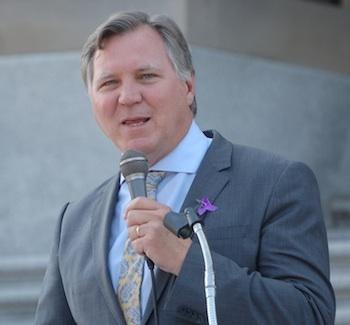Image Caption
Summary
Audio
By Deb Steel
Windspeaker.com Reporter
EDMONTON
“The work that we have done is a reflection of an extensive relationship,” he said.
Feehan was responding to concerns raised in a Windspeaker.com article from last week. Jesse Cardinal, a member of Kikino Metis Settlement, and climate technician with Treaty 8, said the province developed programs for the climate initiative without consultation with Indigenous groups.
“What I’m seeing happening, as an Indigenous person from a Métis settlement, is that these programs are not set up for Indigenous communities,” Cardinal told Windspeaker.com. “The government is coming up with these (climate action) programs and there’s no consultation in the development of these programs.”
See the story here: http://www.windspeaker.com/news/windspeaker-news/albertas-climate-programs-fail-indigenous-communities/
Feehan’s perspective differs with Cardinal’s take, however, but understands where the issue is coming from, he told Windspeaker.com.
The article made it sound “like we just made a bunch of decisions,” he said. “There may be some problems here, but its hardly been a neglect of involvement with (Indigenous) communities in terms of the process moving forward.”
But was it consultation?
“Was there specific consultation on these specific seven programs by taking them out and saying ‘are these the seven programs that you want?’ No there was not,” Feehan said.
But the programs were developed “after a pretty deep relationship with the community about the types of things they would like to see happen. That’s why there are seven different programs that are going to be announced. Not just one.”
Feehan ran down a long list of engagement opportunities government has provided to Albertans, generally, and those specific to First Nations, Métis and other Indigenous peoples.
He said he has personally attended 30-plus nations where the climate leadership initiative was discussed; had talked in dozens of meetings at the legislature where the topic of the climate leadership dollars—a $151-million set aside for the exclusive use of Indigenous communities—was raised.
And then there was three spring meetings held in April, May and June where each First Nations chief, and leader of the Metis Nation of Alberta and Metis Settlement General Council were invited to talk about the administration of that fund, Feehan said.
The goal, he explained, is to put together an entity that will put control of spending those dollars in the hands of the communities themselves.
“When I realized we were able to get that money, I said to the community, ‘Look, I could sit down and make a bunch of programs and run them out the door and have you apply to them’…. But then I had a great desire to have First Nations communities have a lot more voice in this and to come together and help us develop a process at moving forward,” Feehan told Windspeaker.com.
“We talked about a variety of possible board structures, whether it could be a free-standing non-profit agency or whether it should be a government, arms-length body …. Or whether it could be a consultative community of people coming together to direct government policy on this issue. And, it’s the first time that we brought together all of the Métis and all of the First Nations into the same room to have these kinds of conversations to really offer control of the dollars.”
The hope is that by Jan. 1, 2018, dollars will be transferred to that structure or entity. But while they were working on the structure, $41 million was sitting in the budget for the first year of climate leadership work. Feehan said First Nations leaders were facing the building season and said they wanted access to those dollars.
“So I said, for this year, we would design some programs to get things going to get the dollars rolling, because a lot of the nations were saying to me ‘Please do not wait until the structure is put together, because then we lose a whole building season.’ And a lot of them are looking for the chance to start building on their reserves right now, on the settlements right now. And I said, ‘fine.’
“By Jan 1, they’ll be doing the second year’s dollars. In the meantime, I said, ‘so what are some of the things that I can be doing to move forward with the dollars that are coming out this year’?”
“We put together a series of programs that will be announced on Tuesday. And while there was not ‘specific direction’ by First Nations people on the particular programs that were involved, the amount of conversations that we have had, and the amount of involvement and the conversations that we have had has been quite extensive.”
Feehan said his office has funded the meetings on the governance structure, and none of this year’s $41 million for the climate leadership initiative is being used for that work.
Last fall the province offered two pilot programs with $2.5 million for a solar panel program for public buildings on reserve, and a community audit program, which provided funds to look at the needs of the whole community.
With the $41 million, all those communities which submitted for those projects, but which did not receive funding, will automatically have their previous applications considered rather than have to reapply.

